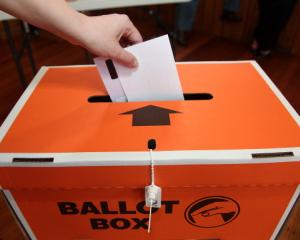News this week about surgical training at Dunedin Hospital is concerning and upsetting.
It raises fears the hospital is haemorrhaging and on a slippery slope to a downgrade.
It adds to frustrations as issues mount.
Dunedin Hospital losing training accreditation in its intensive care unit last year was most unfortunate, and it is hoped progress on an upgrade will help accreditation be reinstated.
But when, in effect, accreditation - albeit in a different department - is lost for a second time, alarms bells really start to clang.
Although the orthopaedic department, according to Southern District Health Board patient services medical director Dick Bunton, has technically retained accreditation as a training unit, it will not be allocated trainees for a year.
As Mr Bunton said, the effect is the same.
The two trainee positions for orthopaedics will have to be filled by registrars.
Adding to the hospital's problems is a warning from the Resident Doctors' Association to surgical trainees to avoid seeking placements at Dunedin Hospital.
The association argues about ''potential knock-on impacts'' for other surgical training.
It could well be it is taking advantage of the orthopaedic matter to score political points and increase pressure.
Doctor unions are certainly assertive.
Mr Bunton reacted angrily.
He said other surgical trainees were unaffected and the board had addressed issues raised by the professional body, but still lost the orthopaedic positions.
Association national president Deborah Powell, for her part, said the board was not communicating with the union.
She said the board seemed to be ''tied up in bureaucracy'' with ''multiple layers of managers'' and Dunedin's reputation as a health training city was at risk.
Whether the union is correct or not in its assertions about wider impacts, the people of the South are justified in their growing alarm.
In particular, anything lost - like accreditation or specific services - is always harder to get back.
The ultimate fear, naturally, is of spasmodic and snowballing downgrades.
The medical school in Dunedin comes under ever-increasing pressure and if it were to depart Dunedin, the city would lose both an arm and a leg.
As we have said many times, the medical school and all related health courses are at the heart of the university, and the university is the heart of the city.
Not only would the city be decimated, but the range and quality of health services themselves would suffer.
Dunedin, no longer a ''tertiary'' hospital, would come to be on a par with the likes of Palmerston North or Tauranga.
Given the spirited and determined fights over the years - and all the local fundraising efforts - this is an especially awful prospect.
Whether it be for scanners, the heart unit or neurosurgery, the South has always been proud of its health services and determined they be the very best.
As it is, the constant scrabbling for savings here, there and everywhere in recent years has taken a punishing toll.
Without doubt, that unrelenting grind - and the state of the clinical services building, leaks and all, is part of that - affects morale.
Despite many, many capable and dedicated staff, surely hospital care will suffer, standards will slip and more mistakes will be made under such circumstances.
The new commissioner and her deputies have come into a situation demanding all their skill and foresight.
The Government, too, is going to have to recognise circuit breakers are required to arrest the downward, dispiriting spiral.
For a start, there must be urgent commitments for new facilities. There must also be an examination of the funding formula.
In the meantime, Dunedin cannot afford the loss of further accreditation, and everyone concerned must do their very best to avoid that happening.
As Dunedin Hospital's reputation is downgraded, the university's ability to attract good students and staff falters.
There is much at stake for the hospital, the university, the city and the South.











